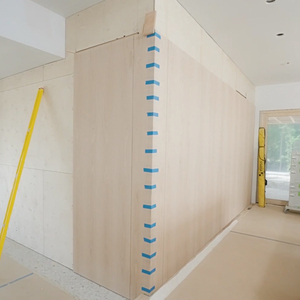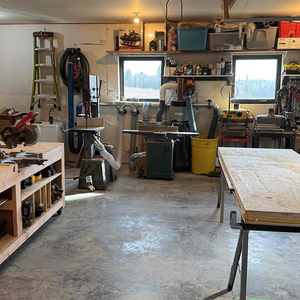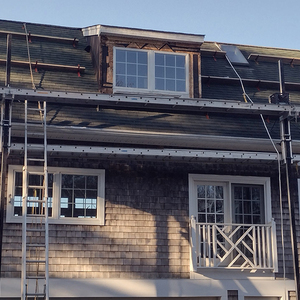
Like any endeavor, the success of a construction project depends on a clear goal and a well-defined path to reach that goal. If your plan is inadequate, your project will be disorganized, take longer to complete, and end up costing more money. But a clear and detailed game plan, called a scope of work can prevent these problems and help to keep your project on track.
A scope of work refers to documents that describe the project objective and specify the activities and materials that are needed to complete that objective. If you are bidding a small project (replacing a broken water heater, for example), the scope of work may be simply a one-page written document. Larger projects will require a larger and longer scope of work. If plans or drawings are necessary, they too become part of the scope.
Determining the scope is a contractor’s job
Because many homeowners fail to provide (or know how to provide) detailed information about their project, contractors must often create a scope of work themselves to accompany their estimate. When drafting a scope of work, it’s essential that the description is accurate, detailed, and includes all the work and materials you will provide. Excluded items and additional work that the homeowner might assume to be included should also be noted. In summary, a good scope of work should tell a prospective client exactly what is, and what is not, included in your bid.
Creating the scope of work can be a challenge. But if you agree to create the scope of work, you need to do it right- especially if the owner intends to give your scope to other contractors bidding the job. Because it may take several hours to create a thorough scope of work, you may want to charge for this service. Of course, you will want to discuss this issue with your potential client before you begin.
Start with the big picture, then get specific
The first thing you should do when developing a written scope of work is to define the project in broad terms. Let’s say you’re remodeling a kitchen. The necessary work for this project may include tasks related to the broad categories of cabinets and counters, painting, and plumbing.
Then you break down each category into specific steps and provide details about required labor, materials, and equipment. Thoroughly describing each activity is an important step toward eliminating schedule and cost overruns-a common complaint from homeowners.
For example, if you are providing materials in addition to labor, then you should specify the product’s exact make, model, and color. It is also a good idea to determine who will supply necessary equipment. For example, are you providing the dumpster or will the homeowner?
Here’s an example of a written scope of work for a kitchen remodel:
Scope of Work: LABOR, MATERIAL, AND EQUIPMENT LIST
Demolition: Remove existing upper and lower cabinets, countertops, sink,
and faucet to dumpster and broom clean
Paint: Paint kitchen walls Behr 854 Aztec Dawn Semi-Gloss, 2 coats
Paint kitchen ceiling Behr 652 Florida White Semi-Gloss, 2 coats
Remove debris to dumpster and broom clean
Cabinetry: Measure and install upper and lower Kitchen Kraft Toscana Series Birch with #202 knobs (see attached brochure)
Remove debris and broom clean
Countertops: Measure and install Corian Prairie Trail with bullnose edging
Remove debris to dumpster and broom clean
Plumbing: Install Moen Chardonna #26884 sink, chrome finish
Install Moen Senore #90552 faucet, chrome finish
Remove debris to dumpster and broom clean
General clean: Remove any remaining debris to dumpster, broom clean
A concise and inclusive scope of work is a vital component of every successful construction project because it clearly spells out your obligations. Without this game plan, disputes and litigation may result. Homeowners do not like unexpected changes in cost, regardless of who is at fault. Once the scope of work is defined, stick to the plans and avoid change.
Fine Homebuilding Recommended Products
Fine Homebuilding receives a commission for items purchased through links on this site, including Amazon Associates and other affiliate advertising programs.

Handy Heat Gun

Affordable IR Camera

Reliable Crimp Connectors

A sufficiently detailed scope of work ensures that you, your subcontractors and your client are all on the same page. It can also help to make sure prospective clients are comparing "apples to apples" when deciding on a contractor.



























View Comments
Excellent article. A lot of conflicts can be avoided during construction projects with a clearly defined scope of work as part of the contract. Too often contractors and clients are in too big of a hurry to get started and end up "flying by the seat of their pants" ultimately causing delays, strained (or worse) relationships and an unhappy customer.
Ed Slusarski
[email protected]
http://www.caddcreations.net
My write ups are even more detailed, such as who supplies what? Who's pocket is it coming out of? I find tht this Scope of Work, could lead you into trouble.
Such as you mentioned, who supplies the dumpster? Are permits pulled?You are going to bring the kitchen up to any new code changes that have been made since ?
Demo Is there exiisting Tile or Backsplash? Who repairs the drywall if need?
What about the Unknown factor? That is why I try very hard to be specific. Such as Electrical, disconnect electrical connection to the existing dishwasher at nearest cnnection point and relocate as needed.
or
Electric to be done by others.
Electric to be done by home owners electrician.
I go through all the steps, so hopefully if I have done my job properly everyone stays on the same program all the way through to completion. There is nothing "worst" thab a Unhappy home owner, or unneeded costs coming out of what is already a small "Profit Margin"
We are homeowners now trying to begin the remodel we have dreamed about for many years. In 20 years of Open Houses, Home Shows, and reading the real estate section, the concept of 'Scope of Work' completely missed me until the first sit-down with a contractor and our hand drawn plans about a month ago. He promised to email us a guideline for our SOW, but we never heard another peep from him. A search on the internet was confusing and thin. Contractors are in the education business, like it or not, not just building. I want to know what is reasonable to expect in our business relationship, and what is unreasonable. We don't want to be difficult, but we need you, the professionals, to communicate and educate. This article could be the basis of an information handout/worksheet (perhaps with a reading list) a contractor could give to prospective customers so we can understand exactly what we need to bring to the discussion so that both parties can reach the goal.
The Scope of Work's purpose is to clearly define "Who" does "What", "How" the work is to be accomplished, and "When" each sub-contractor or supplier is required to do so. This includes, without any exception, all tools and materials supplied by each, to do the work they are each assigned or they agreed to undertake.
It's a task that requires a great amount of time and attention to detail and is not easily summarized in an email or found online somewhere. The Scope Of Work is the result of collaboration between the general and sub-contractors and is something unknown at the bidding stage of the project too, since there is typically little time available at that stage.
Here's a brief summary of how I would go about creating a Scope of Work and what you should expect, as a customer, from your contractor or project manager:
Using the working drawings and specifications, each item of work is outlined and assigned to a subcontractor or supplier. The goal here is to determine the "What" of the project, in other words, "Who" is responsible for supplying and/or installing "What" product or service.
With the "What" portion of the project defined, the next step is to define the "How" part. Using the items identified and assigned in the "Who-does-What" list, each item is grouped into areas of responsibility and assigned to the appropriate subcontractor or supplier. Next to each of these items we provide a description stating "How-they-do-it" in plain language. No fancy terminology or short hand, just plain clear language that is clear and clean. The purpose of the description is to describe the expectations of how each assigned responsibility is accomplished.
At this stage we have an itemized list identifying what each sub-contractor or supplier is required to do and how (crew size, equipment, materials, and tools required) they are to do it.
People, this is where paying for experience and expertise is required. If your contractor or project manager is unable to do at least this much for you, don't hire them.
Period.
Using the scope of work also helps to define the project's schedule outline. Time is now taken to blend the schedule (the when) with the incomplete scope of work (the who, what, and how part). An amount of time is assigned for each task required or identified, with the sub contractor or supplier filling in the blanks. This requires quite a bit of back and forth as each sub-contractor or supplier states how soon they can provide the specified article or crew required, to meet the customer's requirements.
After completing this exercise, the Scope of Work now clearly defines who is expected to do what, how they are to do it, and when it is required.
The result: the Scope of Work defines the contractual obligations the subcontractor or supplier must fulfill and meet for duration of their participation in the project, and also manages the expectations of the client. This also helps to eliminate any future claims since everyone's obligations were clearly defined, ambiguity eliminated, and expectations identified.
I hope this helps.
Good job Kia. The process of creating a scope of work isn't rocket science...it just takes a lot of time to think through all of the details. I have built, remodeled and repaired thousands of homes in my sixteen year building career and I have never hired a subcontractor without a scope of work. We don't want anyone involved in the process to assume anything.
I have created and revised very detailed scopes of work throughout the years that I tailor to each individual project. If any of you are interested in these you can check them out at ArmchairBuilder.com
Michael Luckado
[email protected]